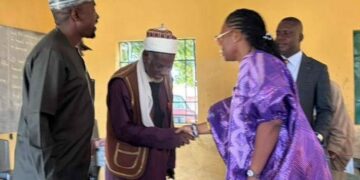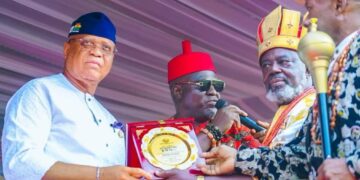On November 10, 2025, Nigeria joined the rest of the world to mark this year’s World Science Day with what appears to be a solemn pledge to strengthen its programmes and policies towards providing indigenous solutions to the challenges confronting the nation.
The new minister of Innovation, Science and Technology, Dr Kingsley Tochukwu Udeh, was apt when he said in his address that it has become incumbent on the nation to intensify its efforts to drive indigenous solutions for national challenges, using science for the total transformation of the country in line with the Renewed Hope Agenda of President Bola Tinubu’s administration.
The 2025 World Science Day with the theme, “Trust, Transformation and Tomorrow: The Science We Need For 2025,” presented a new dimension of leadership in the ministry as the new minister promised that he would give leadership and direct programmes and policies that would produce homegrown solutions to secure the nation and bring prosperity to Nigeria, stressing that science is a key driver of development.
He said, “I will give leadership and direction to inspire our scientists in universities, in research institutes, our youth in the educational sector to utilise innovation in science and technology and ensure prosperity backed by innovation that can take Nigeria where it ought to be.”
The minister stated that the government is investing in human capital, as well as science and technological advancement.
“We have set up Technology and Innovation Hubs and Model Science Laboratories in each of the six geographical zones. Young entrepreneurs, researchers and innovators can experiment, learn, collaborate, and sell new ideas in these centres. This is how we nurture the science we need for 2050,” he said.
In the same vein, the ministry’s permanent secretary, Esuabana Nko-Asanye, in her remarks, stated that the ministry is investing in science for peaceful and sustainable development, adding that it is an essential component that all sectors must adopt to boost their activities and achieve economic diversification.
“I encourage all Nigerians to become advocates of the science, technology and innovation ecosystem because it is critical to hasten the nation’s economic growth and development. Innovation and invention, when it is right, guarantee a better tomorrow. However, we look beyond 2050 to 2060; we are also examining the Agenda 2063 of the African Union (AU).
“We will continue to strengthen public advocacy awareness, campaign and promote national and international solidarity of shared values, using science for the benefit of our society,” she said.
She emphasised the importance of investing in the talent and skills of young Nigerians to enhance their capacity in the sector.
The director-general of the National Airspace Research and Development Agency (NASRDA), Matthew Adepoju, in his remarks, said “science is the greatest engine of transformation the world has ever seen. The science we cultivate today must be bold, disruptive and solution-oriented.
“It must also transform our economy from resource-based to knowledge–based. It must transform agricultural practices to precision agriculture and set our nation on the path of irreversible growth and development,” Adepoju said.
The highlight of the event was when the minister gave awards to two young Nigerian students, Joy Ezekiel of Government School, Tunga Maje and Ogar John Mario of Gado Nasko Primary School, Abuja, for their outstanding performance in science-related topics.
The World Science Day initiated by UNESCO in 2001, is celebrated every November 10 to renew both national and international commitment to science for peace and sustainable development and the need for the responsible and ethical use of science for the benefit of humanity.
This aligns with President Bola Tinubu’s administration’s commitment to economic diversification, innovation-driven growth, job creation, and youth empowerment through science, technology, and innovation (STI).
Nigeria has made remarkable achievements in STI in recent times. For example, the production of Tela Maize variety that is being implemented by the ministry through the National Biotechnology Development Agency (NBRDA) in collaboration with the Federal Ministry of Agriculture and Food Security is ensuring food security and lowering post-harvest losses by providing higher yield and better insect control.
There are also potato and cassava processing facilities across the geopolitical zones, operated by the Federal Institute of Industrial Research, Oshodi (FIIRO), which empowers farmers, encourages agro-processing entrepreneurship and minimises waste.
There is also the neem-based minero organic fertiliser, currently in use by farmers in northern Nigeria. This locally made fertiliser improves soil health, lessens pest infestation and increases food sustainability.
According to the minister, NBRDA has improved bio digesters to produce clean biogas and electricity from biomass waste, supporting integrated rural electrification systems, in order to meet energy and environmental concerns.
In a similar development, Nigerian researchers have developed a carbon monoxide sensor to prevent fatalities from generator fumes, thereby protecting human lives. This innovation addresses the realities of many homes and enterprises, alongside other notable innovations from Nigeria.





